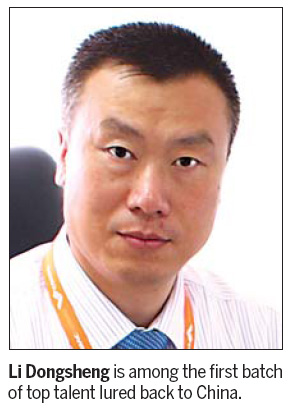Society
Space to soar, back at home
By Chen Jia (China Daily)
Updated: 2010-05-27 07:56
 |
Large Medium Small |

BEIJING - When Li Dongsheng quit his post as a senior technical director at Airbus SAS last September to return to work in China, it caused a stir among his peers.
"I kept receiving phones from Britain for nearly half a year after restarting my career in China," Li told China Daily.
"All the questions were about my decision to return."
"But why do I need a reason for returning to my motherland? Instead, I need a good reason if I did not make this decision," he said.
Li, 45, is among the first batch of top talent lured back to China as part of its "1,000-elite Program", launched to help the nation's transition from a manufacturing hub to a world leader in innovation.
The Central Coordination Group for Talent Work was convened in December 2008 to map out the implementation of the program, in which about 600 people have been involved.
Li is now the chief assistant of model design for the Commercial Aircraft Corporation of China Ltd (COMAC) and the deputy-chief of the Shanghai Aircraft Design And Research Institute.
"I heard that China had a plan for researching and producing commercial aircraft in 2008, and I realized it was a good time for me to contribute to my country," he said.
The government has offered tremendous support for him in job application, visa matters and research environment, he said. COMAC provides Li's family with free accommodation and they will move into a villa soon.
"My only hesitation for moving stemmed from new human relationships, as I didn't have any work experience in China," he said.
"But my new working environment is fantastic and I do not need to compete with others under a special mechanism," he said.
"I feel like a panda with so much honor and respect given to me."
The talent program targets Chinese and foreign academics working at the world's best institutions or as entrepreneurs.
More than 600 people, mostly Chinese, have already signed up for the program.
They all get lead posts in various research institutes, top laboratories or State-owned enterprises.
A few of them have also launched their own businesses.
Each new recruit receives 1 million yuan ($146,000) from the central government, as well as funding from their employers. The Chinese Academy of Sciences has also said it will allocate 10 million yuan to every talent.
Similarly, the government provides the talented professionals with special policies to facilitate their family's new lives in China.
For example, eligible foreign talent and their spouses and children with alien nationalities may apply for the Certification of Permanent Residence for Aliens or multiple entry-exit visa, valid for 2-5 years.
The professionals and their spouses and children may also receive social benefits in the country, including basic pension, medical and work-related injury insurance.